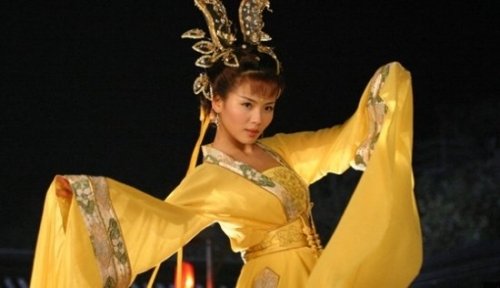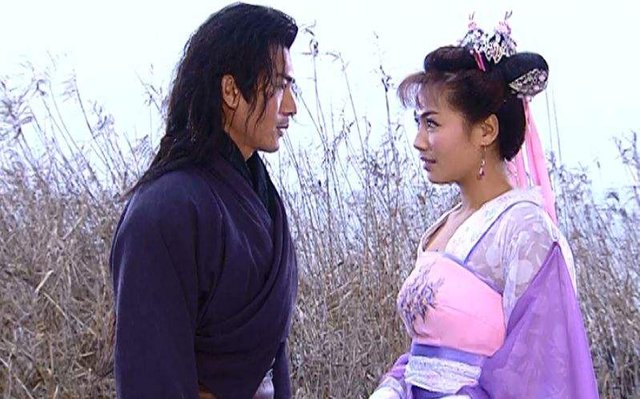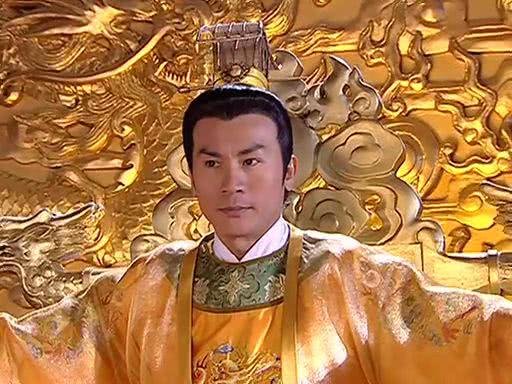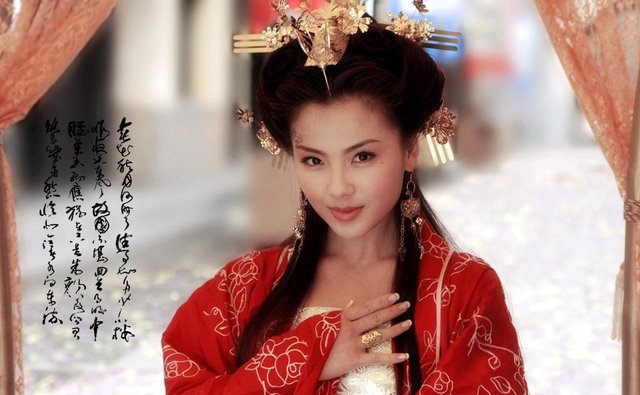The story of a beautiful woman and a hero is not always beautiful.
The story is so legendary.
In the troubled times of the Five Dynasties, a man from an officer's family, riding a red horse, carrying an iron rod, left home alone to run around the world. The hero lost his grip on the disease, and one day he became ill and took refuge in the relatives of the Taoist priest. When he recovered from his serious illness, he walked in Taoism, but he heard a woman crying. So he followed the sound to the locked temple, smashed the door and explored it.

A righteous and indignant young man smashed the old door with one blow, and the bright sunshine outside lit up the flying dust in the hall. He also saw the desperate and helpless girl in the hall. Her eyes looked like autumn water, her eyes were opposite, and she was ashamed and shocked not to turn over. He comforted her that she had been kidnapped by mountain thieves. In the Taoist temple, he decided to send her home.
Heroes should save the United States, after saving the United States, should be double sleeping and double flying, to achieve some hegemony, this is the story of the routine.
In the history of China, Zhao Kuangyin, the founding emperor of the Song Dynasty, had little negative impression. Although he inherited the tradition of bullying orphans and widows and forcing Zen yielding since the Han and Wei Dynasties, Chen Qiaobing became a yellow robe emperor and apparently followed Guo Wei, his former boss and grandfather of the Zhou Dynasty. Zhao Kuangyin obviously failed. However, when his "elders" such as Cao Cao and Yang Jian were believed by folklore to be rapists plotting for the throne, Zhao Kuangxun, who did the same thing, was often regarded as innocent and forced.
In fact, Xuanlang originated from Zhao Xuanlang, the ancestor of Zhao's family in the Northern Song Dynasty, and spread to the people to become Xuanlang. Lang was commonly used to address young men, so it became the name of Zhao Kuangyi when he was young. It is evident that people love him.
The 34-year-old emperor, who started as a grass-roots officer and ascended the throne, was born of a military general's family. His first half of life was actually quite ordinary. He grew up in the Jiama camp in Luoyang, where many military families lived, perhaps a bit like the old family villages in Taiwan. The boys whose fathers went out to fight, always got together and fought, once even destroyed the house.

As he grew older, Zhao Kuang-yin had to change his martial arts into real food and clothing. Just as modern young people were going to seek jobs, Zhao Kuang-yin also went to several warlords one after another. He was once looked down upon, once lost his head, and once resigned with frustration. The Lu snake of the Five Dynasties finally joined Guo Wei's army. Found shelter.
Then, with military merit, he ascended all the way to the Forbidden Army, marched south to the north, and eventually became the general in charge of the Forbidden Army. On the occasion of the early death of Emperor Chai Rong-ying in the late Zhou Dynasty, he planned a drama in which Huang Pao was added to the body to pay homage to Guo Wei, the old boss, and then rolled on the slopes with a pretentious attitude of "all are fatal and half involuntary". Is it...) After a while, he pulled down the orphan widow left by Chai Rong, ascended the throne and opened the Zhao Song Dynasty.
"Zhao Taizu Sends Jingniang a Thousand Miles," written by Feng Menglong, a novelist in the Ming Dynasty, and included in "A Story of Warning to the World." This novel, which was written four hundred years ago, was framed in Zhao Kuang-yin's youth. He met the frail and helpless Zhao Jingniang. Out of morality, Zhao Kuang-yin decided to send her back to Puzhou thousands of miles away. (I send you away, thousands of miles away), because of the same surname, the two recognize brother and sister, all the way, by the way to bomb the villains who bullied Jingniang.

After removing the external obstacles, of course, it is necessary to start dating, but the seemingly timid Jingniang expresses great courage in love, hints repeatedly, hints that it is impossible, and sees the way home is approaching, and then starts to create opportunities:
The heart gives birth to a plan, the road only pushes the abdominal pain to be unbearable, several times must solve. To get the son to help her, and help her to dismount. One up and down, the body snuggled up to the childe, neck neck hook shoulder, all charming. Night sleep and cold road fever, the central male son was reduced to add clothes, soft fragrance, warm jade, there is no emotional place? The childe is straightforward and full of kindness.
Since the physical contact was unsuccessful, Jingniang boldly confessed that she was willing to repay Da En with her physical appearance, while Zhao Kuangyin laughed and refused on the grounds that they both had the same surname and had a righteous ending. Then, Jingniang once again expressed her intention of not marrying a monarch. This time, Zhao Kuangyin not only laughed, he severely scolded and said:
"Zhao Mou is a man of heaven and earth. He has been upright all his life. There is no evil in him. What is the reason why you regard him as a younger generation of benevolence and hope, an adulterer who acts as a false public servant for his own good? If you are evil, I will let go of my hands now, no matter what I do. No wonder I have no beginning and end. "
Jingniang, of course, saw that he was angry and apologized quickly. However, Zhao Kuangyin's reply after returning the color revealed his mind.
"Xian Mei, I am not a glue stick, but this is a thousand miles of loyalty. What is the difference between these two horses today? To turn the past into a hypocrisy and stir up the jokes of the world's heroes. "
So far, it is obvious that the two have no play, but, with the dog blood king Feng Menglong's talent, even if the two "falling flowers intentionally with the flow of water, ruthless falling flowers" comment, does not mean that this matter is over. Although this relationship has long been hopeless, Feng Menglong still arranged for them a quiet but helpless ending, "Since then the empress has become more respectful to her son, and the son has become more compassionate to her son."
The story is originally here, is to send people home, lose packets, sign, and fix! But of course, Feng Menglong, the dog-blood king, was not reconciled, so he arranged gossip from the Jingniang family and what they thought was insight into the hearts of the people, trying to force the Jingniang to Zhao Kuangyin. Generally speaking, the heroine at this time seems to be half hearted, but Jing Niang told her parents:
"The son is straight and selfless, and he is a brother and sister to a child, like a real parent, without any flirting. Today, mom and Dad were asked to stay at home and entertained him for ten and a half months. "
In the novel, there are always some "holiday" people who make things yellow. Sure enough, when Jingniang's family proposes to get married, Zhao Kuangyin goes away in a rage. Jingniang can not be dissuaded. Under the family's cynical ridicule, she hangs herself to prove her innocence and selflessness with Zhao Kuangyin. The story is about to turn to Zhao Kuangyin ascending the throne as emperor, one day thought of this sister, sent someone to look for, only to know that she had died, sigh for a while, the title of her Madame Zhenyi.
Seeing this, it is hard to believe that modern readers, especially female readers, are as touched by Zhao Kuangyi's righteousness or Zhao Jingniang's sanzhenjiulie as people in Feng Menglong's era. When I told this story to my friends, most of my friends responded, "Sick! Even if they "knew" the morality of the time, few people could "understand" or "identify" with the choice between Zhao Kuangxu and Jingniang.
Why? Because this is a contradiction between heroes and virgins.
The "Apron" of Jing Niang is actually called "waist bag", which is used to show women who are poor or in distress. Zhao Kuangyin, instead of playing Wusheng as a mere martial artist, is a balanced singer, and on the other hand, shows a crude and straightforward personality. Red facial makeup in Beijing opera Kunqu opera and even in local operas of all sizes in China shows loyalty and uprightness, in addition to Guan Gong, Zhao Kuangxun is a small number of red-faced characters, can be seen in the opera circles to his esteem.
In the novels of the Ming and Qing Dynasties, heroes must express in various ways that they can resist temptation. As the saying goes, "heroes are sad and beautiful." If they can pass the beauty barrier, they are natural heroes. Just like the "Romance of the Three Kingdoms" in the strongest martial arts is actually able to face Liu Guanzhang's three brothers Lu Bu, but he was trapped in the female color and listen to the shortcomings of women's words, so that he in the "Romance of the Three Kingdoms" even tall and handsome, martial arts superb, but is a villain. In the book "The Water Margin", which can be called "kill when you see a woman, rob when you see a man", the beautiful and coquettish Pan Jinlian is finally killed by his uncle Wu Song in a brutal manner, which is just to show that Wu Song is not confused by the beauty of Pan Jinlian's heroic image.
According to this routine, Zhao Kuang-fu in Sending Jingniang a Thousand Miles seems vague. Although he is eager for justice, good for beginning and ending, he is not a heartless person. Feng Menglong writes about the beauty of Zhao Jingniang through his eyes. In his eyes, Jingniang is not a little girl, but a beautiful woman with tenderness and pity.
Eyebrow sweep spring mountain, eyes horizontal autumn water. With sorrow and hatred, it is like the heart of the West; the desire to cry is like Yang Fei's haircut.
The sound of Pipa does not sound, it is an outstanding princess.
Born of a romantic state, it is Dan Qing painting is not true!
Zhao Kuangyi's contradiction is not only this one, in the story he wrote about his carelessness, boldness and fighting to tiger and tiger breeze, seems to be a rough Zhang Fei general, but also wrote in the story he carefully thought, the first time they met, he saw Jingniang panic, so he hastened to comfort her. Then he decided to take her home. On the way, he told her not to dress too beautifully to avoid being noticed.
Then they stayed on the road, and Zhao Kuangyin discovered that the store's tricks had escaped the danger. After several distress, Zhao Kuangyin beat off the wicked, got a group of treasures, received a group of people, returned to share his help, showing his emperor's style, but at the same time, he ordered people to clean up the dinner, he said:
"Stupid brother has never been a master, but today he has given flowers to Buddha, and he has been shocked by the virtuous younger sister. "
This contradictory hero, who later played the foolish-headed goose who could not understand the amorous feelings, seemed to have opened the distance if he understood Jing Niang's mind. Why was he willing to serve her to get on and off the horse with all kinds of troubles? After taking over a group of people, he still walked alone with Jing Niang and did not buy any other people (or at least a carriage?) And this road was patient and patient until the last burst. It is impossible for him to say that he did not understand Jingniang's mind. In his final refusal of Jingniang's words, he clearly showed that he was not only knowledgeable, but not unmoved.

Then, from Zhao Kuangyin's point of view, what hindered his love? His reasons are:
"Xian Mei, I am not a glue stick, but this is a thousand miles of loyalty. What is the difference between these two horses today? To turn the past into a hypocrisy and stir up the jokes of the world's heroes. "
His point of departure was righteousness, but on the way there was clearly a change in sentiment, except that in his world there was an invisible audience of "heroes of the world" watching over his behavior, and his "true heart / righteousness" would be a joke if it turned into "fake / love". So he had to pretend to be deaf, dumb and fake.
Even if it was merciless, he could not completely refuse, so only "the son also more compassionate Jingniang." Does this contradictory hero really want to fall in love? Unwilling to fall in love? Or is his invisible audience, the heroes of the world, forcing him to fall in love? If it is the first two, then many subsequent plots may not happen, but if the latter, he is afraid of the eyes of others and can not obey his own heart, is a sacrifice of lofty? Or hypocritical evasion?
Compared with the tangled man's mood, Jingniang's mind seemed much simpler. She was in danger, so a man came to help her. Along the way, she listened to the man's words and turned dangerous. So she felt as if she was in love with the hero. She tried to confess and show her love until she was formally rejected. After that, she accepted the result and respected the other side's choice without regret, and finally died in order to achieve the other side's reputation in the eyes of the "heroes of the world".
This may also be the most unacceptable place for readers, a simple, innocent, lovely and beautiful girl, described in front of so many of her admirable advantages, but finally asked her "tonight a dead son, know each other's fame" as if her appearance is to die, in order to achieve Zhao Kuangyin's reputation.
~
The contradictory asceticism hero and the brave chaste, the rigid and gentle, the Yin and Yang, the male and female contrast, become the most important two elements in this story, ceaselessly dialogue, conflict, confrontation, the final result is regrettable, because the hero should not fall in love, especially the hero should not be protected by him, the ethical relationship between the female action. Heart, just as Guan Gong must read the Spring and Autumn Period at night to protect the emperor and sister-in-law, Zhao Kuangyin's reason for rejecting Jingniang was "not married with the same surname." Because in the paternal family norms, men and women with the same surname may be cousins, family members, should not be married.
But people always prefer to believe that the hero is moving. In the current Kunqu Opera, Jingniang keeps exploring Zhao Kuangyin's mind all the way. Until the end of the story, Jingniang sings "Shadows are sent with thousands of miles" and Zhao sings "Jiao Ying and Hong Ying follow each other closely. This situation adds to the fear, although it is a short sentence. However, Jingniang wisely guessed that "Modaota is merciless but sentimental." However, this short-term love between children, but "rain washes the landscape all green", the sentiment disappeared in a flash, for the hero's image, even if the hero and the audience have sentiment, still must be merciless.
Looking back on the 400-year history of sending Jingniang a thousand miles away, the young lady's quiet thoughts deepened one by one in the derivative novels and operas, but Zhao Kuangyin's struggle of tangling but contradictory and refusing to fall in love added a sentence in modern Kunqu Opera: "This feeling and this scene add to fear", which has not wavered for 400 years, saying "Pucao" Tough as silk and no stone shifting ".
~
It is said that in the Kunqu Opera of the Qing Dynasty, there was a lost "Yin Goodbye Brother" in the Kunqu Opera. In the modern Peking Opera and Henan Opera, this play was grafted somewhere, but not much. This story begins after the death of Jingniang, saying that after her death, the ghost followed Zhao Kuangyin and repaid the kindness of his brother who sent him thousands of miles away. In the drama, the tragic firefly led the way to represent the unspeakable regret, which was only 800 miles more, and could not change the end.
That hero can not love, and beauty must be the result of infatuation.